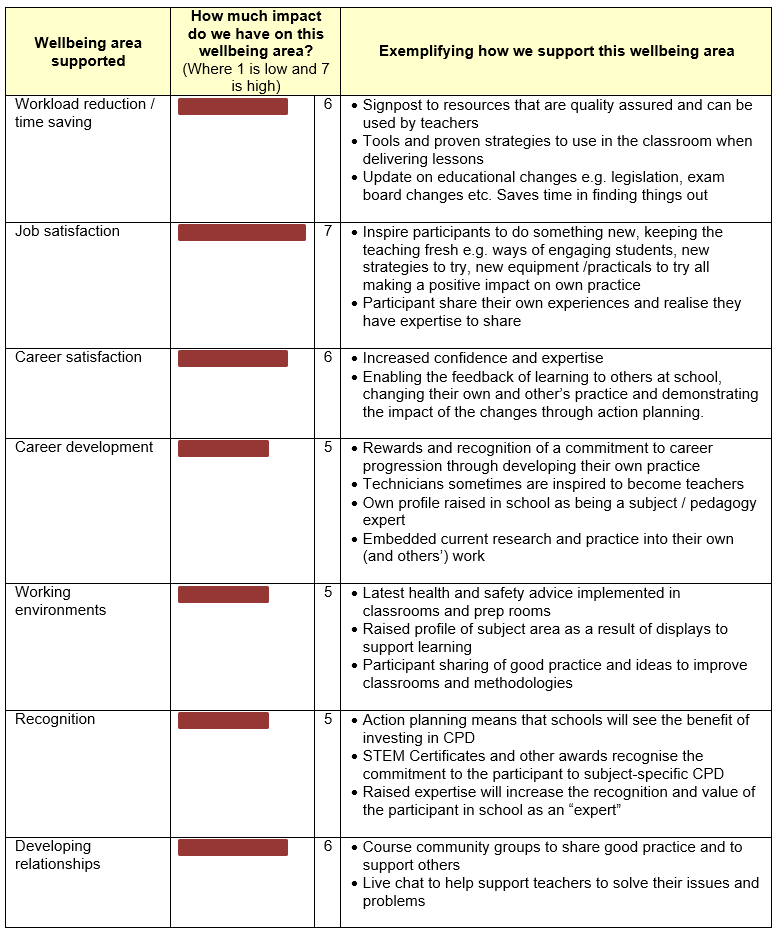The autumn term is always a long and tiring one. This year is especially challenging, as schools adapt to providing a high quality of education in the current climate with the additional concern about pupil and staff wellbeing - the latter in terms of the increased workload that teachers are currently facing.
There are many implicit ways we support the wellbeing agenda through its provision of CPD, resources and other programmes. Teachers work hard and our evaluation feedback shows they are willing to work harder if there is a benefit to them in achieving better outcomes for their students.
In terms of narrowing the attainment gap, the EEF (2020) highlight the importance of high quality teaching as one of the most impactful ways to support this agenda. The short, medium and long term benefits of doing so will support the learning of pupils as well as staff wellbeing even if it may feel counter-intuitive at first to release teachers from the classroom when pupils have been missing teacher contact for so long. Let us examine why.
Teachers will benefit from the opportunity to reduce workload, increase their job satisfaction, get recognition for their learning and to share issues and best practice with like-minded colleagues that are in the same position in their own schools.
Wellbeing is a broad term used to describe a person’s health, happiness and prosperity. It comprises many dimensions. According to the UK Health and Safety Executive (2019), teaching staff and education professionals report the highest rates of work-related stress, depression and anxiety in Britain and this was before the recent pandemic was even heard of.
There are many frameworks around wellbeing, but broadly there are five elements:
-
Health (physical and mental)
-
Relationships with others in the work place
-
Clear purpose (supports motivation and goals)
-
Working environment (facilities, tools and organisational culture)
-
Security (safety, financial, bullying)
Teachers and other educators overwhelmingly enjoy their work, especially when asked about their workplace and the relationships that they build with colleagues and pupils. However, there is evidence that teachers suffer with high workloads, a lack of work-life balance, a lack of resources and in some cases a lack of support from senior leaders, especially around supporting pupil behaviour issues. “Many teachers feel that the advantages of the profession do not outweigh the disadvantages” (DfE, 2020).
There have been several attempts to raise the profile of staff wellbeing in the teaching profession in recent times, most notably in the Headteacher’s Standards (DfE, 2020) and from Ofsted (2019), where the School Inspection Handbook clearly outlines the expectation of school leaders to “take into account the workload and well-being of their staff, while also developing and strengthening the quality of the workforce”.
How we support the wellbeing of teachers and technicians
Engagement with the STEM Learning offer supports the wellbeing of teachers and technicians. However, these benefits are often not exemplified to schools. This short summary table highlights some of the ways that our integrated offer supports the wellbeing of teachers:

Evidence for the impact on teacher and technician wellbeing
The Wellcome Trust (2018) report showed that engagement with our CPD improved teacher retention. Only 3% of teachers (1 in 30) who engaged with our CPD left the profession, compared with 8% (1 in 12) who had not. With workload and wellbeing being at the forefront of reasons that teachers give for leaving the profession, our impact is not just be in developing subject knowledge and pedagogy to improve outcomes for young people, but also through the more efficient, impactful and ultimately rewarding ways that teachers and technicians undertake their role in schools.
There is evidence from our Impact Toolkit to support how engagement with our CPD has a positive impact on wellbeing. Over the last six months, 66% of teachers have responded that the CPD will help them reduce their workload, with 19% strongly agreeing. Teachers and technicians also report improved job satisfaction, even if implementing the learning in school increases the workload for a short while.
Here is a selection of quotes from recent participants in our CPD:
“Although not reducing my workload much, this course will support my wellbeing as I am now better equipped to handle stressful situations.”
Secondary Science Lead – course: Moving into Science Leadership
“I will be able to share the CPD with other Y3/4 staff in school. I'd also like to do the UKS2, KS1 and EYFS modules as a subject lead to improve my knowledge and ability to support staff. It will really help my workload and I think it will have a brilliant impact upon the children if staff use the ideas and resources provided.”
Primary science subject leader – course: Teaching lower KS2 science
The course “…won't reduce my workload as I will be creating new resources and changing the curriculum, but this is positive and will have a good impact. This is the best type of additional workload!”
Primary teacher – course: Teaching upper KS2 science
“To utilise new content, resources and skills effectively will initially increase my workload. Hopefully, over time, this investment will not only benefit both me and my students but decrease time spent preparing for lessons and formative assessment.”
Secondary Teacher - course: Subject knowledge enhancement: KS4 Biology
“Thank you for removing a lot of stress and reducing workload at a busy time.”
Primary teacher - evaluation comment
“Raising the profile of science in your school – it is good to know how to try and do this without increasing the workload of staff, as this can be met with resistance e.g. easy to use websites/where to look for ideas etc.”
Primary science subject leader – course: Help! How do I lead primary science?
References
DfE (2019) Workload reduction toolkit
DfE (2020) Headteachers’ standards
EEF (2020) Impact of school closures on the attainment gap: Rapid evidence assessment
Health and Safety Executive (2019). Work-related stress, anxiety or depression statistics in Great Britain, 2019
Ofsted (2019) Summary and recommendations: teacher well-being research report
Ofsted (2019) School Inspection Handbook
Walker M., Sharp, C. and Sims, D. (2020). Job satisfaction and workload of teachers and senior leaders. NFER.
Wellcome Trust (2018) Developing Great Subject Teaching – Rapid Evidence review of subject specific professional development in the UK.

